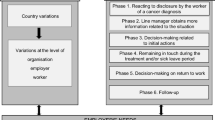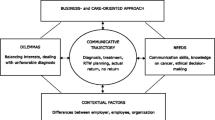Abstract
Purpose
Return to work (RTW) is important for employees who have survived cancer, yet it is challenging for employers. Small enterprises (< 100 employees) might have limited resources to facilitate RTW of cancer survivors. The purpose of this article is to examine how such employers engage in the support of RTW and to uncover their needs.
Methods
Eleven owners and one HR manager representing 12 small enterprises (various sectors) were interviewed regarding their experience with RTW of employees surviving cancer. We conducted a thematic analysis with aspects of Grounded Theory.
Results
The characteristics of being a small enterprise (i.e. informal practical arrangements, working as a family, working with limited resources and people) related to four concerns experienced by these employers (concerns about the employer’s enterprise; the employee’s cancer and recovery; RTW and work adjustments; and about communication). In line with these concerns, employers need information on rights and obligations, RTW arrangements and communication skills during RTW guidance.
Conclusions
In small enterprises, employers have generally close relationships with their employees, which means that support is gladly provided when employees are diagnosed with cancer. They do however have limited financial means to facilitate RTW and workplace adjustments. They therefore perceive long-term sickness and RTW as a major financial risk for the company.

Similar content being viewed by others
References
https://www.cancer.gov/about-cancer/understanding/statistics. Accessed 19 Feb 2018 (incidence worldwide).
https://www.euro.who.int/en/health-topics/noncommunicable-diseases/cancer/data-and-statistics. Accessed 19 Feb 2018 (incidence European region).
De Boer AG. The European Cancer and Network: CANWON. J Occup Rehabil. 2014;24:393–398.
Ferlay J, Parkin DM, Steliarova-Foucher E. Estimates of the cancer incidence and mortality in Europe in 2008. Eur J Cancer. 2010;46:765–781.
McKay G, Knott V, Delfabbro P. Return to work and cancer: the Australian experience. J Occup Rehabil. 2013;23:93–105. https://doi.org/10.1007/s10926-012-9386-9.
Duijts SF, van Egmond MP, Spelten E, van Muijen P, Anema JR, van der Beek AJ. Physical and psychosocial problems in cancer survivors beyond return to work: a systematic review. Psycho-Oncol. 2014;23:481–492.
Tiedtke C, Dierckx de Casterlé B, Donceel P, De Rijk A. Workplace support after breast cancer treatment: recognition of vulnerability. Disabil Rehabil. 2014;37(19):1770–1776. https://doi.org/10.3109/09638288.2014.982830.
Tiedtke C, De Rijk A, Dierckx de Casterlé B, Christiaens MR, Donceel P. Experiences and concerns about returning to work for women breast cancer survivors: a literature review. Psycho-Oncol. 2010;19:677–683. https://doi.org/10.1002/pon.1633.
Taskila T, Lindbohm ML, Martikainen R, Letho US, Hakanen J, Hietanen P. Cancer survivors received and needed social support from their work place and the occupational health services. Support Care Cancer. 2006;14:427–435. https://doi.org/10.1007/s00520-005-0005-6.
De Boer A, Taskila T, Ojajarvi A, van Dijk F, Verbeek J. Cancer survivors and unemployment: a meta-analysis. J Am Med Assoc. 2009;301:753–762.
Amir Z, Strauser D, Chan F. In: Feuerstein M, editor. Work and cancer survivors. New York: Springer; 2009. p. 73–89.
Amir Z, Wynn P, Chan F, Strauser D, Whitaker S, Luker K. Return to work after cancer in the UK: attitudes and experiences of line managers. J Occup Rehabil. 2010;20:435–442. https://doi.org/10.1007/s10926-009-9197-9.
Caron M, Durand MJ, Tremblay D. Perceptions of breast cancer survivors on the supporting practices of their supervisors in the return-to-work process: a qualitative descriptive study. J Occup Rehabil. 2018;2018(28):89–96.
Tiedtke C, Donceel P, De Rijk A, DierckxdeCasterlé B. Return to work following breast cancer treatment: the employers’ side. J Occup Rehabil. 2014;24:399–409. https://doi.org/10.1007/s10926-013-9465-6.
Tiedtke CM, Dierckx de Casterlé B, Frings-Dresen MHW, De Boer AGEM, Greidanus MA, Tamminga SJ, De Rijk AE. Employers’ experience of employees with cancer: trajectories of complex communication. J Cancer Surv. 2017;11:562–577. https://doi.org/10.1007/s11764-017-0626-z.
Greidanus MA, Boer AG, De Rijk AE, Tiedtke CM, Dierckx De Casterlé B, Frings-Dresen MH, Tamminga SJ. Perceived employer-related barriers and facilitators for work participation of cancer survivors: A systematic review of employers' and survivors' perspectives. Psycho-Oncol. 2018;27:725–733.
Gunnarsson K, Larsson M, Schill HP, Josephson M. Return to work in small enterprises. Small Enterprise Res. 2014;21:229–237.
Goorts K, Vandenbroeck S, Rusu D, Du Bois M, Godderis L. Screening for the risk on long-term sickness absence. J Pub Health Res. 2018;7:1419.
Brown V, Clarke V. Using thematic analysis in psychology. Qual Res Psychol. 2006;3:77–101.
Dierckx de Casterlé B, Gastmans C, Bryon E, Denier Y. QUAGOL: A guide for qualitative data analysis. Int J Nurs Stud. 2012;49:360–371.
Fassier J-B, Lamort-Bouché M, Broc G, Guittard L, Péron J, Rouat S, Carretier J, Fervers B, Letrilliart L, Sarnin P. Developing a return to work intervention for breast cancer survivors with the intervention mapping protocol: challenges and opportunities of the needs assessment. Front Public Health. 2018;6:35. https://doi.org/10.3389/fpubh.2018.00035.
Tamminga S, Wolvers M, Greidanus M, Zaman AC, Braspenning A, Frings-Dresen M, de Boer A. Employees diagnosed with cancer: current perspectives and future directions from an employer’s point of view. J Occup Rehabil. 2018;18:132. https://doi.org/10.1007/s10926-018-9802-x.
Cheng A, Zeng Y, Liu X, Liu S, Cheng S, Kwok C, Chung R, Xie J, Feuerstein M. Cognitive challenges while at work and work output in breast cancer survivors employed in a rapidly evolving economy. J Cancer Surviv. 2018;12:753–761. https://doi.org/10.1007/s11764-018-0712-x.
Duijts S. Management of work through the season of cancer survivorship (REVIEW). Curr Opin Support Palliat Care. 2018;12:1751–4258.
Amir Z, Popa A, Tamminga S, Yagil D, Munir F, De Boer A. Employer’s management of employees affected by cancer. Support Care Cancer. 2018;26:681–684.
Yagil D, Goldblatt H, Cohen M. Dyadic resources in the return to work of cancer survivors: exploring supervisor-employee perspectives. Disabil Rehabil. 2018;41:2151–2158. https://doi.org/10.1080/09638288.2018.1459885.
Funding
Kom op Tegen Kanker (KOTK), Koningsstraat 217, 1210 Brussels, BELGIUM.
Author information
Authors and Affiliations
Corresponding author
Ethics declarations
Conflict of interest
The authors declare that they have no conflict of interest.
Additional information
Publisher's Note
Springer Nature remains neutral with regard to jurisdictional claims in published maps and institutional affiliations.
Appendix 1: Interviewguide
Appendix 1: Interviewguide
Topics on involvement in SA/RTW-support for employees with cancer
-
1.
Business policy or guidelines on SA and RTW? Familiar with new reintegration policy?
-
2.
Familiar with diagnosis? Share with colleagues (privacy)?
-
3.
Contact with the ill employee? When and why?
-
4.
Consequences for work? Replacement y/n and why (not)?
-
5.
RTW approach:
-
a.
Communication (subjects of conversation)?
-
b.
RTW initiative?
-
c.
Consultation with other stakeholders (occupational physician, social secretariat)
-
d.
Considerations, weighing pros and cons?
-
e.
Adjustments and agreements?
-
a.
-
6.
Information used or needed (brochures, Google)?
-
7.
What went well and what did not? Why?
-
8.
Recommendations for owners of small businesses?
-
9.
Something to add?
-
10.
Thank you for your cooperation, openness, and trust!
Rights and permissions
About this article
Cite this article
Tiedtke, C., De Rijk, A., Van den Broeck, A. et al. Employers’ Experience on Involvement in Sickness Absence/Return to Work Support for Employees with Cancer in Small Enterprises. J Occup Rehabil 30, 635–645 (2020). https://doi.org/10.1007/s10926-020-09887-x
Published:
Issue Date:
DOI: https://doi.org/10.1007/s10926-020-09887-x




